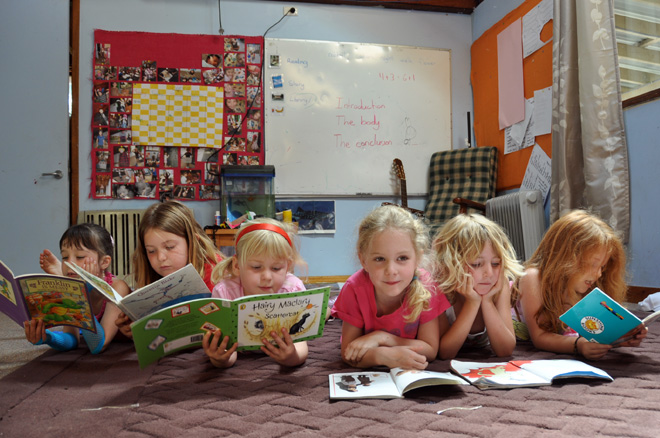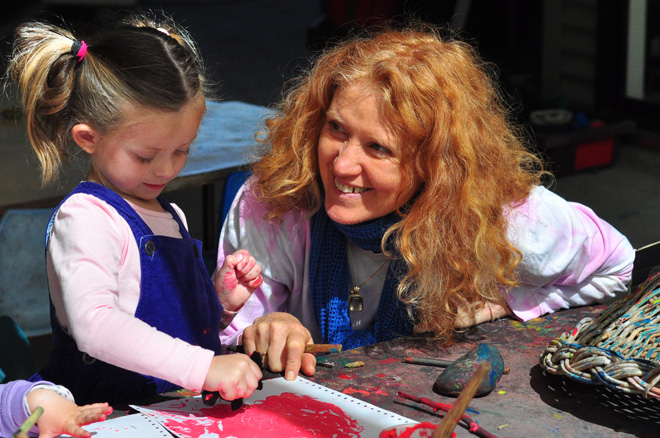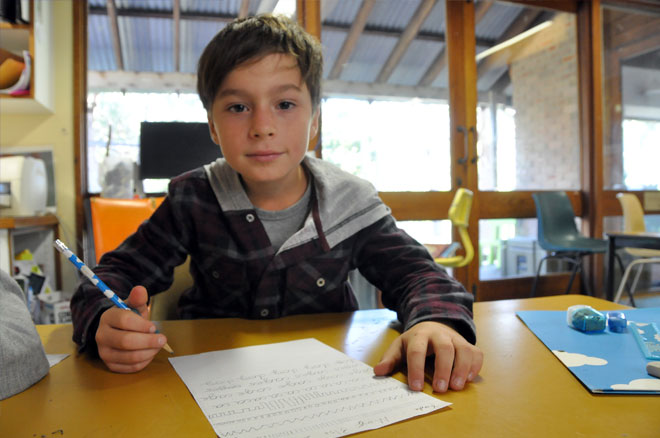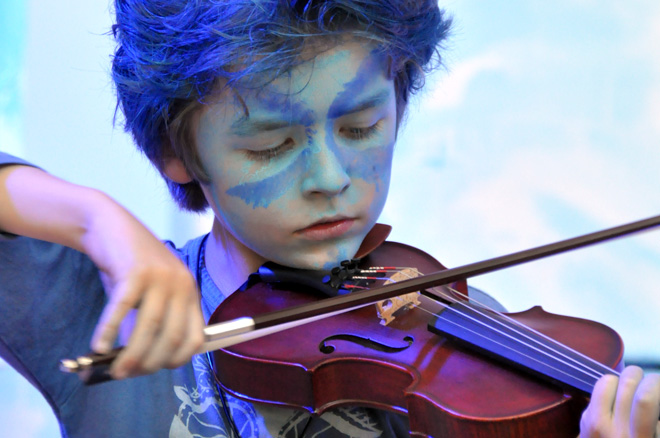The learning programme
NSW Board of Studies accreditation
Kinma consistently receives the highest level of registration possible from the Board of Studies, most recently in our 2014 inspection. Kinma is recognised at university level as one of the few schools in Australia practicing learner-directed education, and we have an internship arrangement with Sydney and Macquarie Universities.
"As a parent I would feel confident with my child's progress; as a teacher, as a principal and as an inspector, I commend you and your staff for the work that we have reviewed here today"- Inspector from the NSW Board of Studies, September 2009.
Kinma's education programme is based on an understanding of child development and caters equally for all aspects of development - social, emotional and academic. It is our aim to foster the development of children to be independent, self-motivated learners and socially responsible members of the community. Our balanced curriculum provides for the development of creative and critical abilities in a cooperative, non-competitive atmosphere.

Primary syllabus and the NSW Board of Studies KLAs
In Primary our syllabus includes all of the NSW Board of Studies Key Learning Areas (KLAs):
- Language
- Mathematics
- Science & Technology
- Human Society and its Environment
- Physical Education & Personal Development
- Creative Arts
Kinma Preschool: Exceeding National Quality Standards
Kinma Preschool completed the new NQS assessment and ratings process with the Department of Education and Care Services Directorate in November 2013, and was assessed with an overall rating of: EXCEEDING NATIONAL QUALITY STANDARD.
“I acknowledge the efforts of management, educators, staff and others involved in preparing for, and participating in, the assessment and rating process and wish you well in your important work with children and families. The National Quality Framework aims to raise quality and drive continuous improvement and consistency in services across the country.
The commitment shown by all the members of your service to successfully complete this assessment and rating cycle will no doubt help to foster a culture of continuous quality improvement within your service.”
- Kim Hoskin, Regional Operations Manager, Early Childhood Education and Care Directory

Preschool syllabus
In Preschool, we have always operated with the now recognised new National Quality Framework Standards (NQF). These include:
- Relationships with Children
- Educational program and practice’
- Children’s health and safety
- Physical Environment
- Staffing arrangements
- Collaborative partnerships with families and communities
- Leadership and service management
For further information see http://www.mychild.gov.au.
The Kinma learning environment
Both our Preschool and primary classroom buildings have been designed around an innovative style of education. These modern brick, timber, corrugated iron and steel buildings blend with the bushland environment.
The lofts, verandahs, arts/cooking areas and group areas provide for many different activities to occur simultaneously. Children are delighted by the unique design of these classrooms.
The learning programme at Kinma extends beyond the school grounds however, and children regularly visit centres which are relevant to their theme of study, including museums, concerts, exhibitions and farms.

Non-competitive learning
At Kinma, we strive for cooperation between teachers, other educators, parents and children. Parents are encouraged to maintain close contact with the teachers. This promotes a positive home/school relationship and a secure child.
With the support of staff, parents are welcome to assist with the educational programs.
Child-centred learning
1. Children are encouraged to realise their potential in all areas of development.
To facilitate this objective, Kinma offers an individualised approach to education where children work at a level which is suitable to their current knowledge and needs.
2. Children are challenged to think, to develop skills and to understand concepts through a child-focused approach to learning.
Recognised principles of child development provide the foundation for the curriculum at Kinma. The educational programme provides for a development of skills and concepts.
3. Children are introduced to new materials when their pattern of development determines that they are ready.
Programs at Kinma aim to progressively promote each child's level of skills and understanding and records are kept to facilitate this process. However there are not rigid age expectations as to when each child's growth will occur.
4. Children are seen to be central in the learning process.
This is provided for through an activity-based approach to all areas. Teachers plan experiences, prepare appropriate materials and guide children in their learning. Through this process children develop independence in themselves and a confidence in their ability to learn.

Gifted & talented children
At Kinma we are concerned with the broader context within which each child functions.
We include in this social, personal and cultural factors which contribute to the shaping of academic abilities, limitations, special interests and potentials of each child.
Rather than adopting a definition of giftedness or talent or a programme of identification, Kinma actively seeks to create a dynamic learning environment for all children and adults;
- We regard individualised education as a necessity for all children including those with particular abilities.
- We seek to maintain an adaptive educational setting in which teachers respond to the needs of children by encouraging questioning and curiosity, conceptual understanding and self-directed learning.
- Our groups are small and flexible - children are grouped in such a way that individuals can be extended in any particular area regardless of chronological age.
- Parents are actively involved in the school and teachers maintain close contact regarding each child's development.
- Our overall emphasis is on creative and critical thinking, social adjustment and personal responsibility.
- Teachers are encouraged to pursue their own professional development and their knowledge of current theory and practice in all areas of education, including any specific to the particular children with whom they work
Term Dates 2025
- Term 1: Tues 4 February to Fri 11 April
- Term 2: Wed 30 April to Fri 27 June
- Term 3: Wed 23 July to Fri 26 Sep
- Term 4: Wed 15 Oct to Wed 17 Dec
Term Dates 2026
- Term 1: Mon 2 Feb – Thu 2 April
- Term 2: Wed 22 April – Fri 26 June
- Term 3: Wed 22 July – Fri 25 Sep
- Term 4: Wed 14 oct – Wed 16 Dec
Contact us
127 Coolowie Rd,
Terrey Hills NSW 2084
Find us on Google Maps
Primary: +61 2 9450 0738
Preschool: +61 2 9486 3018
Email Kinma

